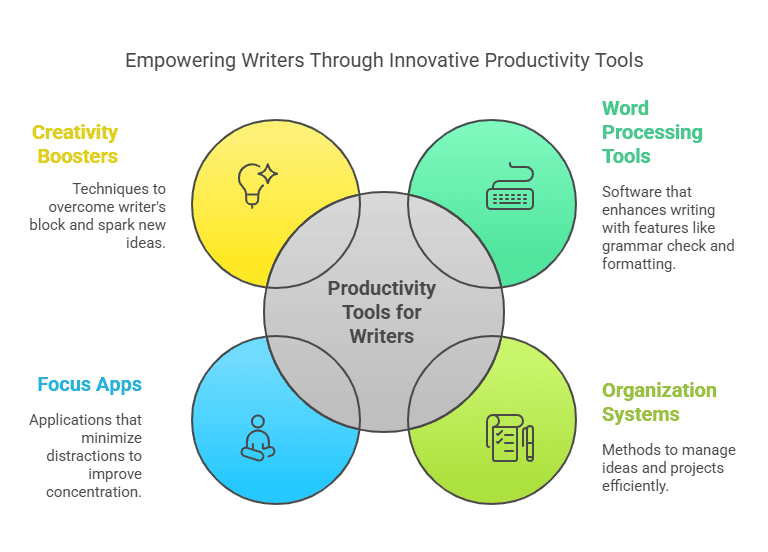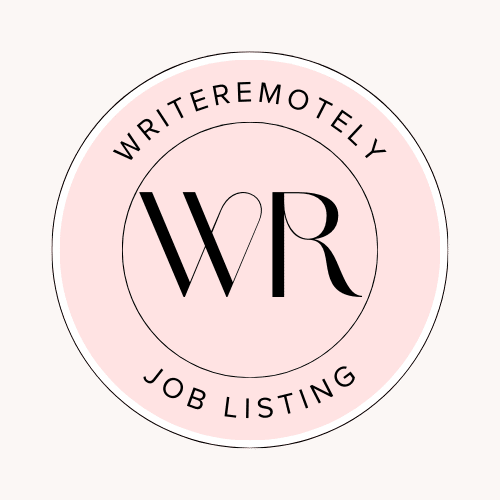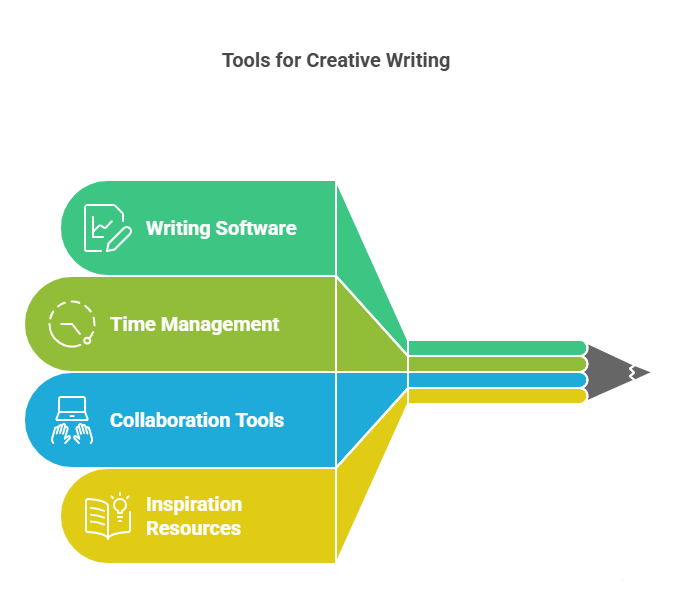As a writer, staying focused and productive can be tough. But, the right way to Unlock Your Creative Potential with productivity tools for writers can really help. They make writing easier and better.
Using these creative writing tools, I’ve reached new heights. I’ve produced top-notch work. In this article, I’ll share my top picks to help you too.
Key Takeaways
- Discover the most effective productivity tools for writers.
- Learn how to enhance your writing skills with the right tools.
- Streamline your writing process for better productivity.
- Explore creative writing tools that can help you produce high-quality work.
- Unlock your full potential as a writer with the right resources.
The Writer’s Struggle: Why Productivity Matters
Writing is a tough journey filled with challenges. These challenges test our productivity and creativity. We face many daily hurdles, like writer’s block and distractions.
Common Challenges Writers Face Daily
Writers deal with many obstacles that slow them down. These include writer’s block, distractions, and time management issues. Good writing tips and resources can help overcome these problems.
| Challenge | Impact on Writing | Potential Solution |
| Writer’s Block | Delays progress, causes frustration | Writing prompts, freewriting |
| Distractions | Reduces focus, decreases productivity | Focus-enhancing apps, dedicated writing space |
| Time Management Issues | Affects deadlines, overall productivity | Project management tools, scheduling |
The Connection Between Productivity and Creativity
In writing, productivity and creativity work together seamlessly. Being productive helps create a better creative writing space. Using effective writing techniques and resources boosts this connection, leading to better writing.
Unlock Your Creative Potential with Productivity Tools for Writers
To improve your writing, using the right productivity tools is key. These tools make the writing process smoother. They assist you in staying organized, maintaining focus, and boosting creativity.

How the Right Tools Transform Your Writing Process
The writing process, from research to editing, can be tough and slow. However, using the right tools can simplify the process. They let you focus on the creative parts of your work.
Key benefits of using productivity tools include:
- Improved organization and time management
- Enhanced focus and reduced distractions
- Better research management and citation organization
- Streamlined drafting and editing processes
For example, Scrivener and Google Docs help organize your research and drafts. They keep everything in one place.
| Tool | Function | Benefit |
| Scrivener | Research organization and drafting | Improved organization and focus |
| Grammarly | Grammar and spell checking | Enhanced writing quality |
| Trello | Project management and organization | Better time management and productivity |
Balancing Technology and Creative Flow
Technology can make writing better, but finding the right balance is important. Too much tech can distract and slow you down.
To find this balance, use tools like Freedom or SelfControl. They block distracting websites. Also, write in focused blocks and avoid doing too many things at once. This keeps your creativity flowing.
By balancing tech use and creative flow, you can write better and faster.
Word Processing Tools That Elevate Your Writing
Effective word processing tools are key for writers to boost their productivity and creativity. There are many tools available, from full writing software to specific grammar and formatting tools. Scrivener, Google Docs, and Microsoft Word alternatives are some of the top choices, helping to make writing easier.
Scrivener, Google Docs, and Microsoft Word Alternatives
Scrivener is great for handling big writing projects, with features like project management and customizable writing spaces. Google Docs is perfect for working with others online. Microsoft Word is still a favorite, but LibreOffice is a good option for those looking for something different.
- Scrivener offers a comprehensive approach to writing, including project management and research organization.
- Google Docs excels in cloud-based collaboration and accessibility.
- Microsoft Word is a traditional choice, but alternatives like LibreOffice are worth considering.
Grammarly, ProWritingAid, and Hemingway Editor
Tools like Grammarly, ProWritingAid, and Hemingway Editor help improve your writing. Grammarly is known for its grammar and spell check. ProWritingAid has many tools to help you write better, including grammar checks and plagiarism detection. Hemingway Editor improves clarity by highlighting hard-to-read sentences.
- Grammarly enhances writing with its advanced grammar and spell check.
- ProWritingAid provides a comprehensive toolset for improving writing quality.
- Hemingway Editor improves clarity by highlighting hard-to-read sentences.
Vellum, Atticus, and Other Formatting Solutions
Formatting is also important, and tools like Vellum and Atticus help with this. Vellum is great for ebook formatting, especially for indie authors. Atticus makes book formatting easy, helping writers who need precise control over their work.
Organization Systems That Keep Your Ideas Flowing
For writers, staying organized is key. It helps them keep track of ideas, research, and schedules. In the fast-paced world of writing, a good organization system is crucial. It’s not just about jotting down ideas; it’s about managing the writing process well.
Evernote, Notion, and OneNote for Writers
Top note-taking apps for writers include Evernote, Notion, and OneNote. Evernote lets writers capture ideas on any device, so nothing gets lost. Notion combines notes, tasks, and databases into one tool, offering a customizable space for writers. OneNote makes it easy to gather and organize information, helping writers structure their work.
Trello, Asana, and Plottr for Story Planning
Trello, Asana, and Plottr are excellent tools for organizing and planning your story. They help writers visualize their story, track characters, and meet deadlines. Trello uses boards, lists, and cards to organize tasks, making it a visual powerhouse. Asana is great for solo writers managing projects. Plottr offers a visual interface for plotting stories and tracking scenes.
Zotero, Mendeley, and Research Management Tools
Research is vital for writers, especially in academia and tech writing. Tools like Zotero and Mendeley help manage research. Zotero is a citation management tool that helps collect, organize, and cite sources. Mendeley offers similar features, helping writers organize research and collaborate. These tools are essential for writers who need to navigate complex research landscapes.
Focus Apps That Boost Your Writing Productivity
Focus is key for writers, and many apps help with this. Writers often get distracted by social media and emails. Luckily, there are apps to help them stay focused.
There are many types of apps that help writers focus. For example, Pomodoro timers and Forest are great for keeping your mind on the task. Forest turns your focus into a game by growing a virtual forest. If you leave the app, your forest dies, keeping you motivated.
Forest and similar apps turn productivity into a game. Apps like Focus@Will offer music that helps you concentrate. This music is designed to keep you focused, helping you stay on track with the right tunes.
Forest, Focus@Will, and Pomodoro Timers
- Forest: A productivity app that gamifies staying on task.
- Focus@Will: An app that provides music curated to enhance concentration.
- Pomodoro Timers: Tools that help writers work in focused intervals.
These are just a few examples of apps that help writers stay focused. Ambient sound generators like Noisli and Brain.fm also help. They offer sounds to create a productive environment. Noisli lets you mix sounds for the perfect background noise, while Brain.fm has soundscapes to boost focus.
Noisli, Brain.fm, and Ambient Sound Generators
- Noisli: An ambient sound generator that allows for customization.
- Brain.fm: A tool that offers a variety of soundscapes to enhance productivity.
Building good writing habits is also important. Apps like Streaks and Habitica help with this. Streaks track your productivity, while Habitica makes building habits fun.
Streaks, Habitica, and Writing Habit Builders
- Streaks: An app that helps writers track their productivity streaks.
- Habitica: A productivity app that gamifies building good habits.
In conclusion, many apps help writers stay focused and productive. From Forest to Habitica, these tools fight distractions and help build good habits. They are essential for improving writing productivity.
Creativity Boosters That Defeat Writer’s Block
As a writer, I’ve found that certain tools can be incredibly helpful in defeating writer’s block and sparking new ideas. Writer’s block is a common challenge many writers face. But, various tools can help overcome it.
One of the most effective ways to overcome writer’s block is by using writing prompt tools. These tools can provide the spark needed to get your creative juices flowing again.
Reedsy, Seventh Sanctum, and Writing Prompt Tools
Reedsy and Seventh Sanctum are two popular platforms that offer writing prompts to help stimulate your creativity. Reedsy is known for its community of writers and editors. It provides a wealth of resources, including writing prompts and contests. Seventh Sanctum, on the other hand, offers a wide range of writing prompts across various genres, from fantasy to science fiction.
Other writing prompt tools include:
- Reedsy Prompts: A platform that hosts writing contests and provides prompts to help writers get started.
- Seventh Sanctum: Offers a vast collection of writing prompts across different genres.
- Writing.com: A community-driven platform with a wealth of writing prompts and resources.
Pinterest, Milanote, and Visual Inspiration Boards
Visual inspiration is another powerful way to overcome writer’s block. Platforms like Pinterest and Milanote allow you to create boards and pin images that inspire you.
Here’s a comparison of these visual inspiration tools:
| Tool | Features | Benefits |
| Visual discovery, boards, pinning | Large community, diverse content, easy to use | |
| Milanote | Note-taking, task management, visual boards | Flexible, customizable, integrates with other tools |
ChatGPT, Sudowrite, and AI Writing Assistants
AI writing assistants like ChatGPT and Sudowrite are becoming increasingly popular among writers. These tools can help generate ideas, provide suggestions, and even assist with writing tasks.
Some key features of these AI writing assistants include:
- ChatGPT: Can generate human-like text based on prompts, useful for brainstorming and idea generation.
- Sudowrite: Offers AI-powered writing assistance, including suggestions and content generation.
Conclusion: Building Your Personalized Writing Toolkit
As writers, we aim to unlock our creative potential and create top-notch content. Productivity tools help us improve our writing skills and stay organized. We’ve looked at various tools that can make our writing better, from word processors to apps that boost creativity.
To unlock your creative potential, building a personalized writing toolkit is key. Try out tools like Scrivener, Grammarly, and Trello to see what fits you best. This way, you’ll make your writing process smoother, tackle challenges, and reach your goals. As an author guide, I suggest trying these tools to boost your writing abilities and stay updated.
Creating a customized toolkit will help you reach your full writing potential. Whether you’re an experienced author or just beginning, the right tools can significantly impact your writing journey.
FAQ
What are the best productivity tools for writers?
Top tools for writers include Scrivener, Grammarly, and Trello. They help with organizing, grammar, and managing projects. Tools like Forest, Focus@Will, and Noisli help you stay focused. Reedsy and Seventh Sanctum offer writing prompts to beat writer’s block.
How can I enhance my writing skills with productivity tools?
Tools like ProWritingAid, Hemingway Editor, and Vellum boost your writing skills. They offer grammar tips and editing help. Evernote and OneNote are great for organizing research and ideas.
What are some effective organization systems for writers?
Note-taking apps like Evernote, Notion, and OneNote are key for writers. Project management tools like Trello, Asana, and Plottr help keep projects on track. Zotero and Mendeley manage research and citations.
How can I stay focused while writing?
Use apps like Forest, Focus@Will, and Pomodoro timers to stay focused. They help avoid distractions and keep a writing schedule. Noisli and Brain.fm create the perfect writing environment with ambient sounds.
What tools can help me overcome writer’s block?
Tools like Reedsy, Seventh Sanctum, and writing prompt generators fight writer’s block. Visual boards on Pinterest and Milanote spark creativity. AI assistants like ChatGPT and Sudowrite offer suggestions and guidance.


 Owner of Write Remotely. Connecting businesses with talented writers and empowering remote work.
Owner of Write Remotely. Connecting businesses with talented writers and empowering remote work. 

